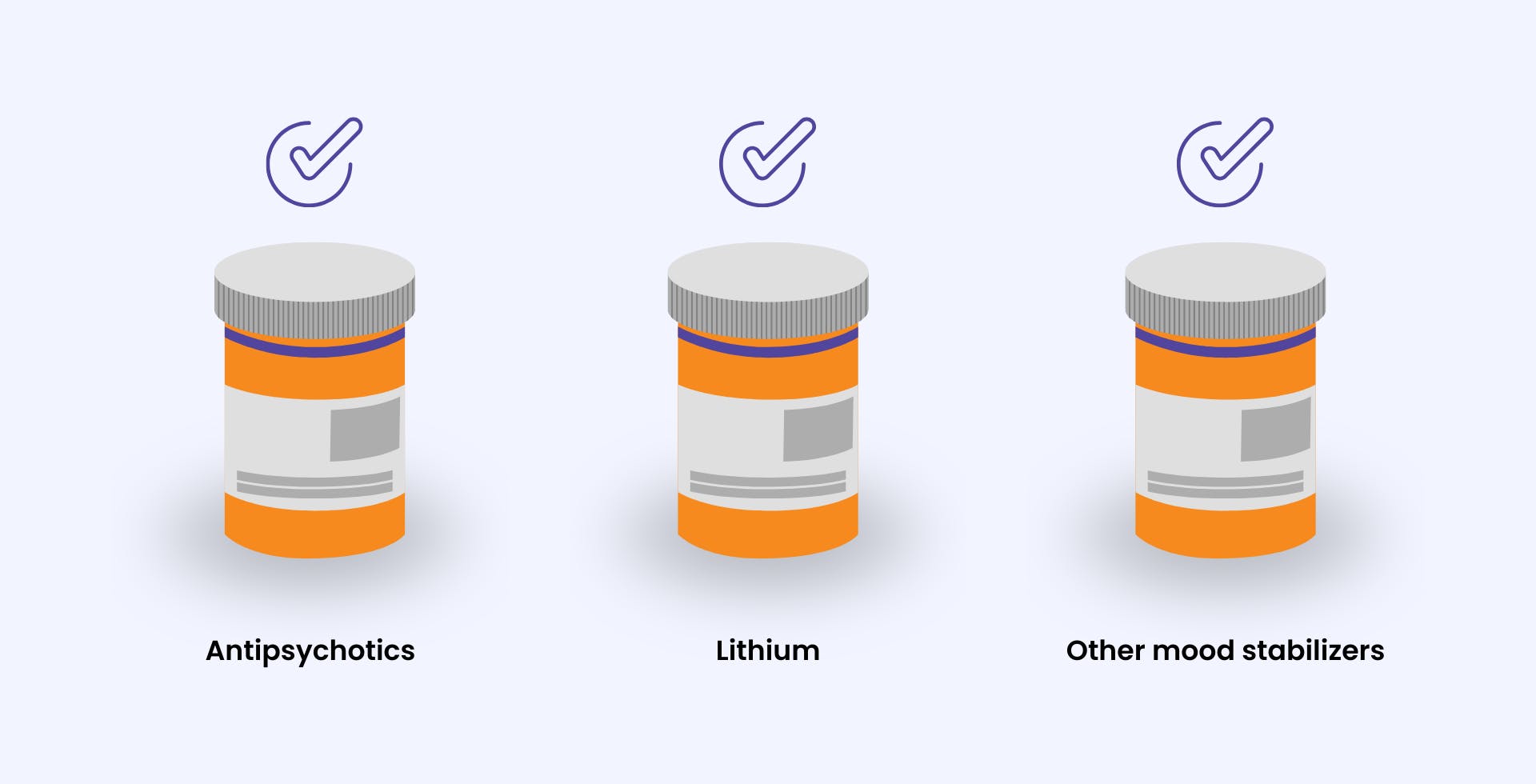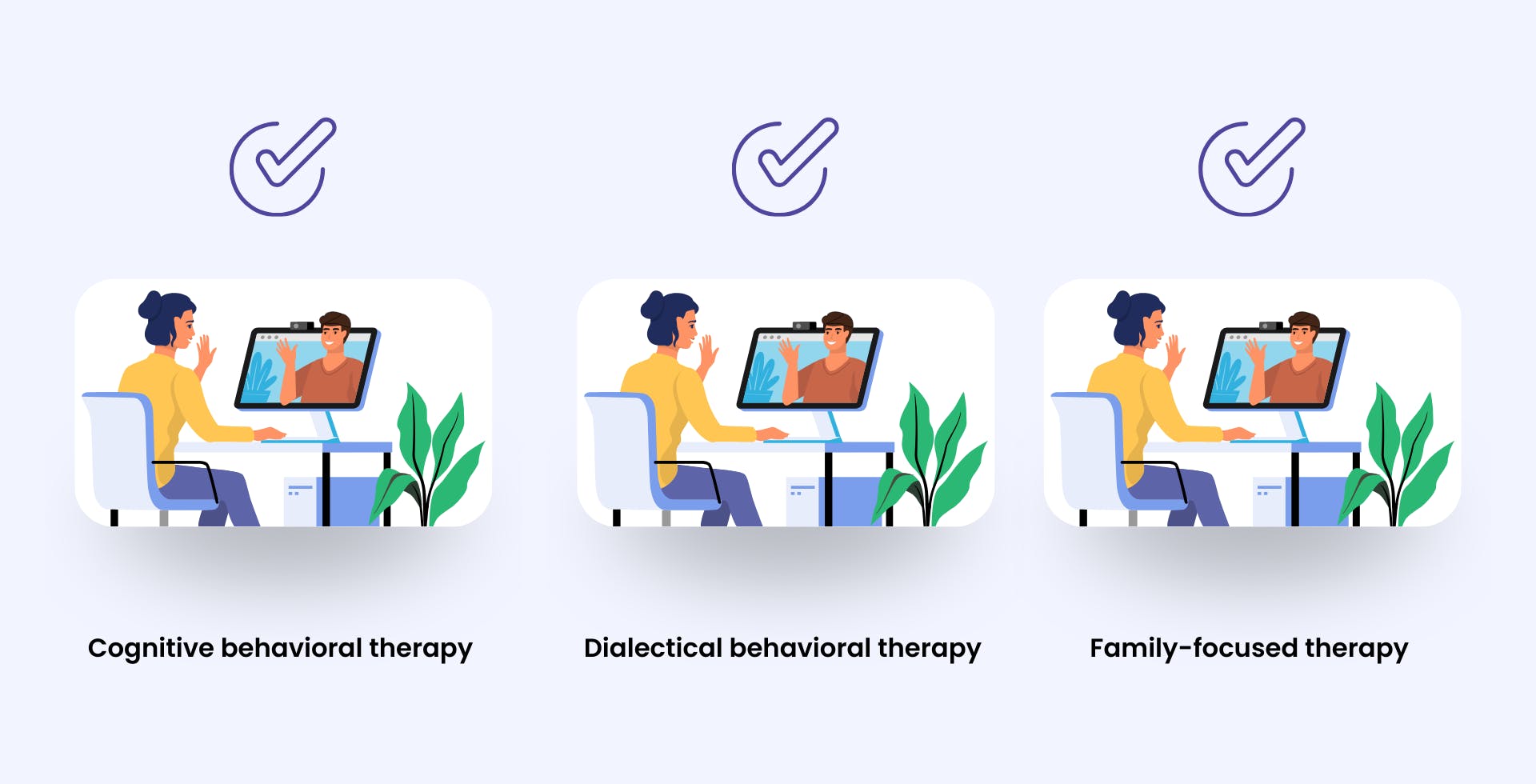For millions of people around the globe, navigating the highs and lows of bipolar disorder is part of daily life. If you're newly diagnosed or seeking more knowledge, understanding the treatments available is fundamental to managing the complexities of bipolar disorder successfully.
This detailed guide explores the various treatment paths available, empowering you with the tools to help you start finding the approach that best suits your needs.
What is bipolar disorder?
Bipolar disorder, formerly known as manic depression, involves dramatic shifts in mood, energy, behavior, and motivation. These episodes can be severe, resulting in manic periods of high energy, followed by depressive episodes with feelings of sadness and low energy. These fluctuations can also affect sleep, judgment, and the ability to think clearly.
Episodes can be unpredictable, occurring rarely or multiple times a year. However, intervening early can help reduce the severity or length of an episode.
Everyone with bipolar disorder experiences it uniquely, so you need treatments tailored to you, which often involve medication, therapy, and lifestyle changes. By exploring the various treatment options, you can take control and lead a more balanced life.

Medication treatment options
In the management of bipolar disorder, medication is often a central component, but what works best can differ greatly between people. Understanding the classes of medication and how they work could help in finding the right treatment.
Antipsychotics
Antipsychotics are a class of drugs more commonly associated with schizophrenia, but they are also an option for treating bipolar disorder.
- How they work: Antipsychotics act on neurotransmitters in the brain, particularly dopamine and serotonin. By regulating these chemical messengers, they can help stabilize mood and reduce the severity of manic or mixed episodes.
- Typical dosages: Dosages for antipsychotics can vary widely based on the specific drug, the individual's weight, and the severity of symptoms.
- Potential side effects: They can include weight gain, diabetes, and movement disorders. However, newer ‘atypical’ antipsychotics are believed to have less severe side effects than older ‘typical’ antipsychotics.
A medical professional will gradually increase the dosage over time to find the right balance between effectiveness and side effects.
Lithium
Lithium has been a mainstay in the treatment of bipolar disorder for decades. It's one of the most effective medications for preventing the ‘highs and lows’ but requires careful monitoring because it has a narrow therapeutic window.
- How they work: The exact way lithium works in the brain remains unclear, but it's believed to regulate sodium movement in nerve and muscle cells, influencing neurotransmitters and mood stabilization.
- Typical dosages: Lithium dosages are carefully adjusted to reach the right level in your blood. Achieving an effective dose typically requires several days, during which healthcare providers frequently monitor blood levels to stabilize the dosage.
- Potential side effects: The side effects of lithium can range from mild hand tremors and increased urination to more severe effects like damage to the kidneys or thyroid if not monitored closely.
In taking lithium, you and your prescriber would need to work together to monitor its effectiveness and minimize the risks.
Other mood stabilizers
Mood stabilizers are a diverse group of medications that help manage the symptoms of bipolar disorder. They can be stand-alone treatments or used in combination to manage mood fluctuations.
- How they work: Mood stabilizers work by moderating the levels of neurotransmitters in the brain, preventing the extreme fluctuations associated with bipolar disorder.
- Typical dosages: The amount of medication needed can vary greatly depending on the person, the medicine used, and the severity of the disorder. It's also common for healthcare providers to ask for blood tests to monitor conditions.
- Potential side effects: Common side effects include weight gain, drowsiness, and possible adverse effects on your liver and kidneys.
Mood stabilizers can be vital in managing bipolar disorder, offering you a tool to live a more balanced life.
What if I don't like how my medications make me feel?
Side effects from bipolar medications are common. If your medicine is ineffective or the side effects are too much, it's important to talk to your prescriber. They can change the dose, try a new medicine, or suggest other treatments.

Therapy treatment options
When managing bipolar disorder, therapy can complement medication. With in-person or online therapy, you’ll find a judgment-free space that allows you to understand your condition better and learn to constructively manage bipolar symptoms.
How therapy can help
During therapy sessions, you can work through challenges, learn new ways of thinking, and build a support system.
When therapy is most important: It can be especially beneficial during times of transition or stress when bipolar symptoms are more likely to arise.
Effective therapy approaches for bipolar disorder
While there are different therapy strategies, each provides essential skills and knowledge for managing bipolar disorder. These are standard therapies, and we’ve outlined their role in an integrated treatment approach.
Cognitive Behavioral Therapy (CBT)
CBT is a short-term, goal-oriented psychotherapy treatment that takes a hands-on, practical approach to problem-solving.
What it helps with: Its goal is to change patterns of thinking or behavior behind any difficulties you face to improve how you feel.
Dialectical Behavioral Therapy (DBT)
DBT is a cognitive-behavioral therapy that addresses emotional and relational aspects, teaching ways to manage intense reactions in various relationships.
Why it’s important: Some individuals may have a tendency to respond more extremely or in an out-of-character manner to emotional situations, particularly in romantic, familial, and friendship contexts.
Family-Focused Therapy (FFT)
FFT is a type of therapy designed to educate families about bipolar disorder. If you’re reading this because a family member has bipolar disorder, you may want to consider this type of therapy.
What it helps with: Its goal is to enhance communication, improve problem-solving, and promote supportive family interactions.
Strategies that support medication and therapy
Beyond medications and therapy, a variety of tools and actions can further enhance your management of bipolar disorder, such as:
- Illness education: Understanding the nature of your condition and its treatment options can empower you to take an active role in your care.
- Light therapy: For some individuals, exposure to bright light dulls bipolar disorder's depressive symptoms. Sitting in front of a special light box every morning can mimic the effects of natural sunlight to help regulate one’s mood.
- Meditation and mindfulness: These practices can help you become more aware and accepting of your thoughts and feelings. Meditating or practicing mindfulness also reduces stress, which can trigger episodes.
- Healthy lifestyle: Maintaining a healthy lifestyle is vital for managing bipolar disorder. This means exercising regularly, eating a balanced diet, and getting enough sleep. Avoiding alcohol and recreational drugs is also important, as they can trigger episodes and interact with medications.
Finding the right bipolar treatment for you
Landing on the right blend of treatment options can involve working closely with healthcare providers, attending therapy, living a healthy life, and talking openly with the professionals who prescribe your medication.
Remember: It may take time to find the optimal combination of treatments, but with patience and persistence, managing bipolar disorder is possible.
If you're considering options to manage your condition, we can help lead you to the most appropriate treatment plan. Our licensed care teams offer personalized online therapy and medication management for bipolar disorder.
This is a treatable condition, and many people with the disorder lead full, productive lives.
Take the first step: Sign up to schedule your first session, where our mental health experts can better understand your current condition and recommend a treatment plan for you.
Image via senivpetro on Freepik.

How to Support a Loved One with Bipolar Disorder

Bipolar vs. BPD: How To Tell The Difference

9 Common Triggers for Bipolar Episodes

Call 911 if you’re having a
mental health emergency
Text Home to 741-741 if you're in emotional
distress and need immediate support
Call or text 988 Suicide &
Crisis Lifeline. Chat service
is available at 988lifeline.org.